Was the Magnus Carlsen Tour Final the most successful online chess event of all time? It was certainly one of the most dramatic! Paraphrasing what WGM Jennifer Shahade said during the live commentary, you couldn’t have written a more stunning finale to the event. While Carlsen won the Tour and bagged the $140,000 first prize, the real winner was online chess and its further surge as a phenomena in online platforms.
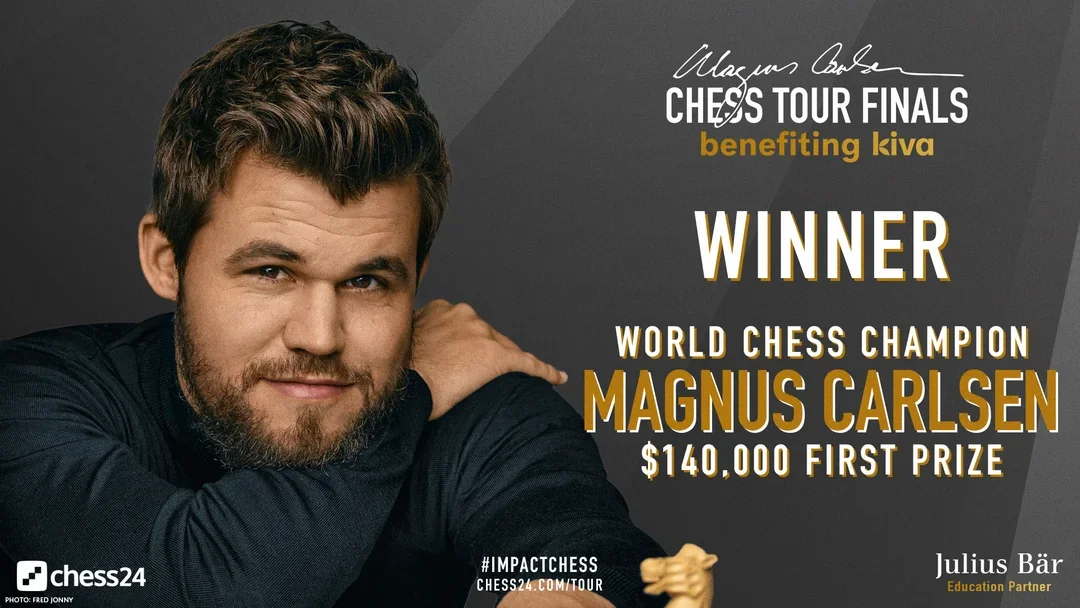
I usually do not try to write about elite online tournaments, and for two reasons. First, I do not generally watch the events live. I only catch parts of them and tend to look at the games in my spare time during the day, when I can focus on in-depth analysis of the ideas.
Second, I think that perhaps my online chess strength suffers when compare to my over-the-board talent. So I sometimes fear that I miss important factors going into the decisions players make about openings or middle-game strategy. Still, this event has so much to offer that I broke my own rules and penned this piece. A pity that I can only cover some of its excitement!
The Tour Final was played from August 9-20, with GMs Magnus Carlsen, Daniil Dubov, Ding Liren, and Hikaru Nakamura being the four participants in the event. Dubov was seeded in the Final after winning the Lindores Abbey event, while Carlsen had won the other three “Tour stops.” Nakamura and Ding qualified for the final on the basis of their overall Tour scores.
The Final featured a knockout format with each player facing one another five times in the semi-finals and seven times in the final. Every round comprised of four rapid games of 15 minutes with 10 seconds increment. In case of a 2-2 tie, a two game blitz mini-match with 5 minutes with 3 seconds increment was played, with an Armageddon blitz game in reserve to break a further tie. With such an intense format, players would need a lot of focus, physical stamina, and a good state of mind to have any hopes of winning.
Before the start of the tournament I considered both Nakamura and Carlsen the two favorites to reach the event final. While I do not mean to discount the ability and strength of their formidable opponents – Carlsen faced Ding in the semis, while Dubov faced Nakamura – Carlsen and Nakamura have themselves immersed in online chess. While Nakamura’s online presence and stellar blitz record dates back to before he became an over-the-board elite player, Carlsen have been extremely active on different online platforms playing all kinds of time-controls.
More than any of the other world elite, these two players are most often in what Mihaly Csikzentmihalyi called ‘flow,’ or what is more commonly known as ‘being in the zone.’ Here Carlsen and Nakamura were calm throughout all the ups and downs and maintained a high level of focus, showing great resilience while fighting their way back when the odds in certain positions were against them. True, luck is always a factor in online chess… but luck does tend to favor the prepared.
The Semis
In the first mini-match or set of the semi-final between Nakmaura and Dubov, the Russian young player, whose opening style has numerous fans (including truly yours) around the world, had the upper hand in the entire rapid part, and Hikaru was lucky to maintain the balance. If Dubov hadn’t blundered in a few promising (if tricky) positions, including the last game in the blitz part where the Russian had a clear advantage right into the middlegame, this semi-final might have gone rather differently.
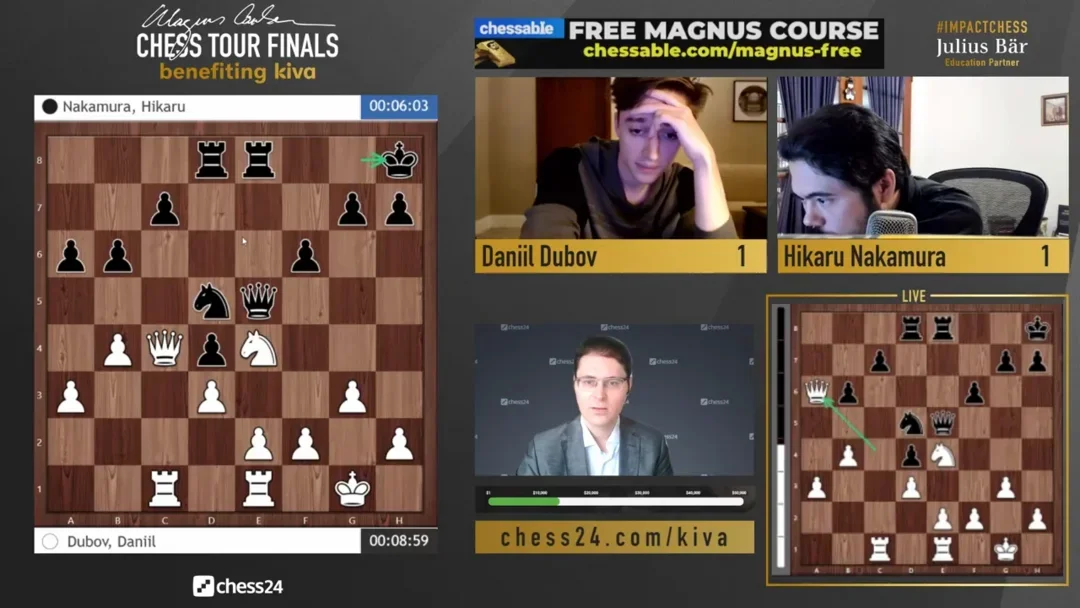
But after surviving day one against the aggressive Russian, Nakamura went on win the next two sets of matches convincingly, whitewashing the Russian 3-0 in match play. The result does not really depict the intensity of the match and the blend of opening ideas played by the players, but it showed that Nakamura’s handling of time pressure and consistency is a much more important factor than Dubov’s superb and intellectual opening preparation.
My evaluation of the match: Dubov was superbly prepared in the opening and outplayed Naka in a few occasions. However, Naka showed a higher consistency and accuracy over the course of their game and was the deserved eventual winner.
The other semi-final, featuring Ding vs. Carlsen, was a totally different kind of a match. The Chinese GM not only had to face an opponent who had shown that this format suits him just fine (remember Carlsen had won 3 out of the 4 qualifying events), but he also had to the beat the Chinese firewall which may well have affected how his clock would run in an online game.
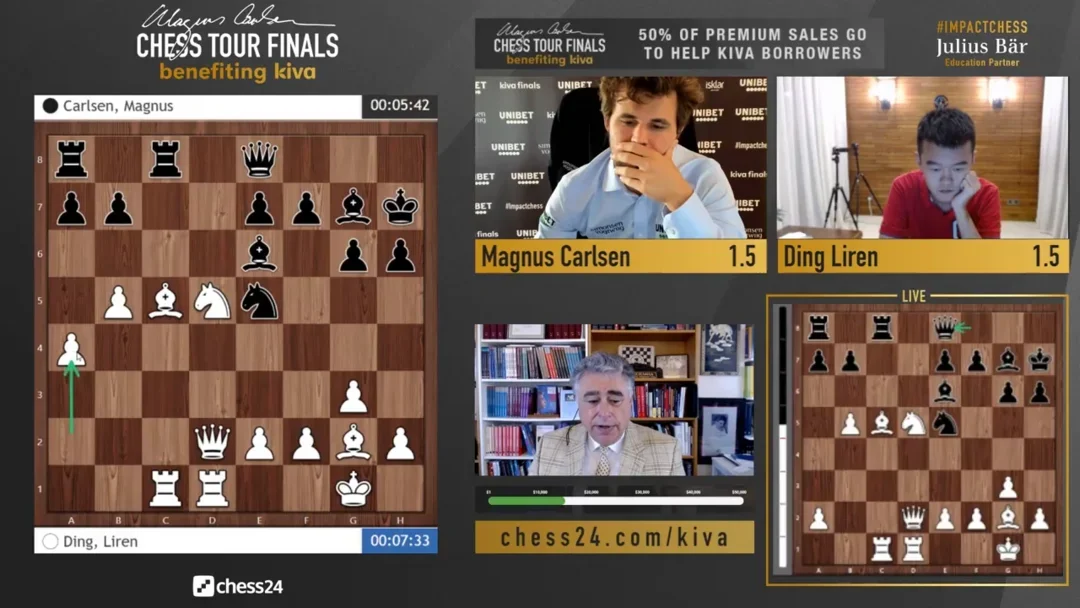
Still, Ding didn’t fail to impress. He spilt the first blood in the one of the first set, but Carlsen, in what in my opinion was the coolest game of the entire match, immediately retaliated to even the score.
[pgn][Event "Magnus Carlsen Chess Tour Finals "] [Site "?"] [Date "2020.08.09"] [Round "2.1"] [White "Carlsen, Magnus"] [Black "Ding, Liren"] [Result "1-0"] [ECO "D02"] [WhiteElo "2881"] [BlackElo "2836"] [Annotator "Moradiabadi"] [PlyCount "47"] [EventDate "2020.??.??"] [WhiteTeam "Norway"] [BlackTeam "China"] [WhiteTeamCountry "NOR"] [BlackTeamCountry "CHN"] {[%evp 0,47,32,32,32,34,29,22,40,39,61,29,17,-10,16,24,11,17,19,13,13,17,10,-4, 13,-5,16,-14,-20,-6,-3,-25,25,28,13,26,30,-3,40,-20,110,172,167,155,248,261, 250,263,262,284]} 1. d4 Nf6 2. Nf3 d5 3. Bf4 {Carlsen does play the London in his over-the-board games too.} c5 4. e3 e6 5. c3 Bd6 6. Nbd2 cxd4 $5 {Ding tries to show that Carlsen cannot keep his bishop on f4.} 7. Bxd6 dxe3 (7... Qxd6 8. exd4 {is just better for for White, so Ding needs to commit to 7. ... dxe3.}) 8. Ba3 exd2+ 9. Qxd2 Nc6 10. Qg5 {Black is up a central pawn, but his pieces lack harmony as he is forced to play ... Rg8.} Rg8 11. Bd3 h6 $6 { White's queen is better off on e3, so why push it there?} 12. Qe3 Qb6 (12... Qc7 {followed by Bd7 and 0-0-0 seems more in accordance with the position.}) 13. Qe2 (13. Nd4 $1 {would have offered White more of an advantage.}) 13... Bd7 14. O-O O-O-O 15. b4 Kb8 $2 (15... e5 $5 {was a must!} 16. Nxe5 Nxe5 (16... Rge8 $2 17. Nxd7 $14) 17. Qxe5 Rge8 18. Qf4 g5 19. Qd2 Kb8 {and both ... Ne4 and ... Bb5 offer Black a better position. White could have maintained the balance by playing Qd4 earlier.}) 16. b5 Na5 17. Ne5 Be8 18. Bb4 $18 {The rest is a walk in the park for Carlsen, who rips apart Black's position in a few moves.} Rc8 19. a4 Ne4 20. Bxe4 dxe4 21. Qxe4 f6 22. Qh7 Nb3 23. Qxg8 Nxa1 24. Qxe8 1-0 [/pgn]
The rapid portion of the first set ended at 2-2, and then Ding took the lead in the blitz. But the world champion showed his immense ability to come back, winning on demand to tie the match and force an Armageddon showdown. Ding duly won the set by forcing perpetual with the black pieces in the Armageddon game. A great start for Ding!
But Ding was barely a match for Carlsen in the next two sets, losing both 0.5-2.5, and Magnus outclassed Ding in every aspect of the game. While it was obvious that Ding was ‘dabbling’ with some new opening in his repertoire he simply wasn’t playing to the level he found in the first set.
Carlsen opened the fourth set with a convincing victory, while Ding managed to win a beautiful game in the second rapid game to balance the score.
[pgn][Event "Magnus Carlsen Chess Tour Finals "] [Site "?"] [Date "2020.08.12"] [Round "23.1"] [White "Ding, Liren"] [Black "Carlsen, Magnus"] [Result "1-0"] [ECO "E62"] [WhiteElo "2836"] [BlackElo "2881"] [Annotator "Moradiabadi"] [PlyCount "61"] [EventDate "2020.??.??"] [WhiteTeam "China"] [BlackTeam "Norway"] [WhiteTeamCountry "CHN"] [BlackTeamCountry "NOR"] {[%evp 0,61,19,13,22,-3,37,25,30,17,17,17,15,12,12,30,34,43,44,50,58,49,47,52, 35,31,32,31,25,54,39,49,56,62,55,-22,17,17,49,11,-6,46,84,57,55,47,101,1,-18, -60,119,-41,-38,116,515,523,517,517,29995,29996,29997,29998,29999,-30000]} 1. d4 Nf6 2. c4 g6 3. g3 Bg7 {Calrsen does not play the King's Indian so often, but he does seem to like to try it against fianchetto lines for White. I can recall at least one occasion he had beaten Ding in this system.} 4. Bg2 O-O 5. Nc3 d6 6. Nf3 Nc6 7. O-O e5 8. d5 Ne7 9. e4 b6 $6 {I do not have Carlsen's in-depth knowledge but I am really not sure about this off-beat move. I also doubt that Carlsen would ever again play it!} 10. Rb1 {Following in Petrosian's footsteps from his game against Panov in 1950, one that Petrosian lost despite being better for the most of the game.} a5 11. Re1 (11. a3 Bd7 12. b4 axb4 13. axb4 Qc8 14. c5 bxc5 15. bxc5 Bh3 16. c6 h6 17. Rb7 Ne8 18. Nd2 Bxg2 19. Kxg2 f5 20. f3 Qd8 21. Nc4 Nc8 22. Be3 f4 23. Bf2 fxg3 24. hxg3 h5 25. Be3 Qf6 26. Qd2 Qf7 27. Nb5 Ra4 28. Qc2 Ra8 29. Bb6 h4 30. Bxc7 Qf6 31. Ba5 hxg3 32. Qe2 g5 33. Bd2 Ne7 34. Nb6 Ra2 35. Nc3 Rxd2 36. Qxd2 g4 37. Rxe7 Qh4 38. Kg1 Bh6 39. f4 Qxe7 40. Nd7 Bxf4 41. Rxf4 Rxf4 42. Qg2 Rf3 43. Ne2 Qg5 44. Nb6 Qe3+ {0-1 (44) Petrosian,T-Panov,V Moscow 1950}) 11... Nd7 12. a3 h6 13. Nh4 $1 {A beautiful prophylactic move designed to stop ...f7-f5.} f5 {and yet!! } 14. exf5 gxf5 15. Qc2 Nf6 16. b4 Bd7 17. c5 {Ding executes the typical plan, intending to gain space on the queenside and opening the h1-a8 diagonal.} axb4 18. axb4 e4 $2 {A decisive positional mistake in a difficult position.} (18... Qe8 19. c6 Bc8 {is still better for White but not winning!}) 19. c6 Be8 20. f3 $1 {suddenly Black's position becomes critical.} Nfxd5 21. Nxd5 Nxd5 22. fxe4 fxe4 $2 {This loses by force.} (22... Nc3 23. Rb3 Nb5 {was a must}) 23. Bxe4 Nc3 24. Bxh6 $1 {A nice tactic, which is not that hard for a player like Ding to spot!} Qf6 $2 {and the curtain falls!} 25. Bh7+ Kh8 26. Rxe8 Rfxe8 27. Ng6+ Kxh7 28. Nf8+ Kxh6 29. Qh7+ Kg5 30. Qh4+ Kf5 31. Qf4# 1-0 [/pgn]
After a 2-2 tie and a draw in the first game of the mini-blitz match, a ‘blunder fiesta’ ensued and Carlsen was the one who made the “penultimate mistake,” winning after Ding missed a back-rank threat:
[pgn][Event "Magnus Carlsen Chess Tour Finals "] [Site "?"] [Date "2020.08.12"] [Round "27.1"] [White "Ding, Liren"] [Black "Carlsen, Magnus"] [Result "0-1"] [ECO "E11"] [WhiteElo "2836"] [BlackElo "2881"] [Annotator "Moradiabadi"] [SetUp "1"] [FEN "1q3rk1/4bppp/1n6/pN1p4/P1nP4/3N2P1/5P1P/2RQB1K1 w - - 0 25"] [PlyCount "42"] [EventDate "2020.??.??"] [WhiteTeam "China"] [BlackTeam "Norway"] [WhiteTeamCountry "CHN"] [BlackTeamCountry "NOR"] {[#] Black's position is difficult but playable. But now we start to have a number of tactical blunders from both players.} 25. Ne5 Qb7 $2 {Walking into a double attack.} 26. Bxa5 $1 Bg5 (26... Nxa5 27. Rc7 $18) 27. Bxb6 Bxc1 28. Bc5 $1 {An important in-between move.} Ra8 29. Nxc4 dxc4 30. Qxc1 Rxa4 31. Nc3 Ra5 {[#]} 32. h4 $4 {A painful blunder for Ding.} (32. Ba3 $1 Qa8 33. Bb2 Qf3 34. d5 $18) 32... Qa8 $1 {With no defense against ... Ra1. White should give up a piece.} 33. Qb2 Ra1+ 34. Nb1 c3 35. Qb3 h6 36. d5 Qc8 37. Kg2 Qxc5 38. Nxc3 Ra8 39. Ne2 Rd8 40. Nf4 Qd4 41. h5 Qe5 42. Qb6 Rb8 43. Qc5 Qe4+ 44. Kh3 Rb1 45. Kg4 f5+ 0-1 [/pgn]
Evaluation: Carlsen played superbly and won the 2nd and 3rd rather convincingly. Though, Ding showed resilience and fought his way back in the 4th set, only succumbing to his fate due to a blunder in blitz. I think he needs more practice playing online events!
The Finals
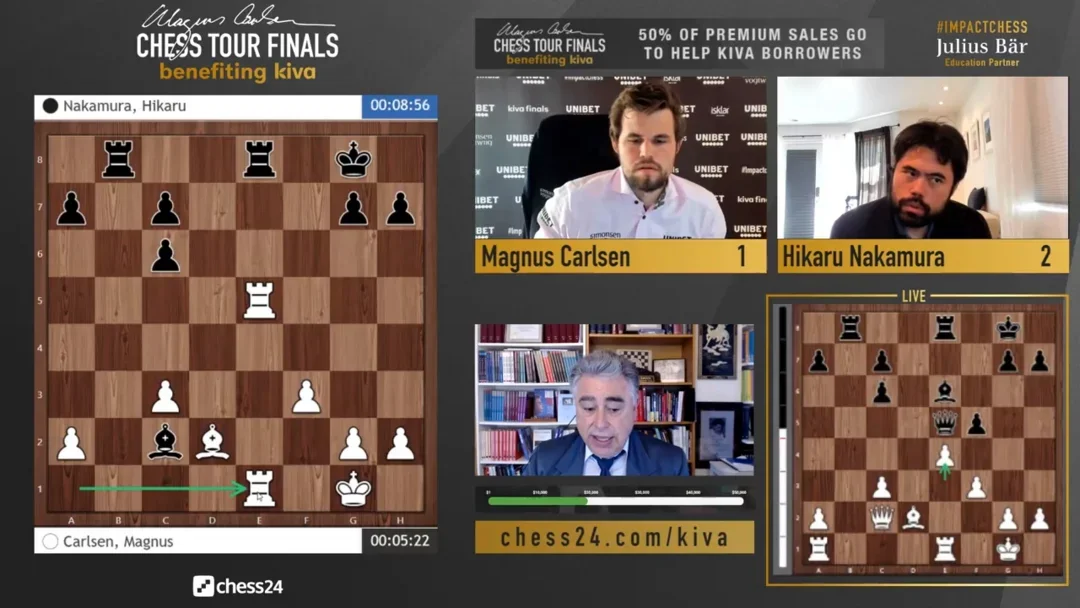
And so we got what everyone was waiting for: the much awaited Carlsen-Nakamura final. Carlsen was considered the prohibitive favorite for several reasons, their career results against one another and Carlsen’s recent streak of online victories primary among them. In a post-match interview Naka himself said that he expected to win two matches out of the seven.
Rising to the occasion, Nakamura played fantastic chess, winning three matches and taking the lead on the world champion three times! Every single match was close and hard fought.
Nakamura won the first set with three draws and a single victory with the black pieces. The opening they played occurred one more time in the second set, where Nakamura was victorious again. While the outcome of the opening was dodgy, Nakamura proved more resourceful and managed to win in crazy time pressure.
In the second set Nakamura won the opening match once again with his hybrid of the Vienna and Queen’s Gambit Accepted. Here I include a note with the critical moments of both games:
[pgn][Event "Magnus Carlsen Chess Tour Finals "] [Site "?"] [Date "2020.08.14"] [Round "30.1"] [White "Carlsen, Magnus"] [Black "Nakamura, Hikaru"] [Result "0-1"] [ECO "D24"] [WhiteElo "2881"] [BlackElo "2829"] [Annotator "Moradiabadi"] [PlyCount "112"] [EventDate "2020.??.??"] [WhiteTeam "Norway"] [BlackTeam "United States"] [WhiteTeamCountry "NOR"] [BlackTeamCountry "USA"] {[%evp 0,112,25,26,18,-17,3,6,18,18,49,51,83,75,77,52,69,43,52,47,58,40,64,33, 67,62,45,54,37,26,50,49,59,56,66,49,50,69,69,29,47,47,7,21,35,0,42,20,47,21,20, 66,66,20,0,-25,-10,0,0,4,-29,-33,-23,-10,-16,-10,-10,-6,-6,-23,-34,-106,-97, -102,-96,-100,-100,-102,-100,-200,-206,-206,-219,-214,-214,-215,-224,-239,-256, -265,-287,-328,-307,-335,-307,-343,-365,-435,-435,-429,-328,-341,-336,-347, -352,-375,-463,-507,-509,-509,-509,-527,-527,-537,-527]} 1. d4 Nf6 2. c4 e6 3. Nf3 d5 4. Nc3 dxc4 5. e4 b5 $5 {Engines assess this as dubious, but it has very strong practical merit.} 6. e5 Nd5 7. Nxb5 Nb6 8. a3 $5 (8. a4 {This move has been employed by several strong GMs in the past couple of years.} Qd7 $1 { The engine's favorite.} 9. Be2 Nc6 10. O-O Na5 11. Ng5 h6 12. Ne4 Bb7 13. Nc5 Bxc5 14. dxc5 Nd5 15. Ra3 a6 16. Nd4 {All top choices by the engine through here.} Ne7 17. Qd2 Qd5 (17... O-O-O $5) 18. Rg3 Qxc5 19. b4 cxb3 20. Ba3 $4 ( 20. Nxb3 $11) 20... Qxa3 21. Qxa5 Bd5 $1 {Securing b3 is so important. This shows deep understanding of the position by Nakamura.} 22. Rxg7 c5 23. Bh5 cxd4 24. Rxf7 Kd7 25. Bg4 Kc6 26. Bxe6 Bxe6 27. Rf6 Kd7 28. Qb6 Bd5 29. Rd6+ Ke8 30. Rxd5 Nxd5 31. Qc6+ Ke7 32. Qb7+ Ke6 33. Qc6+ Ke7 34. Qb7+ Ke6 35. Qc6+ Kf5 36. Qxd5 Qe7 37. e6+ Kg6 38. Qe4+ Kg7 39. Qxd4+ Kg8 40. Qg4+ Qg7 41. Qc4 b2 42. f4 Rb8 43. Qe4 Rh7 44. Rb1 Qb7 45. Qe2 Rc7 {0-1 (45) Carlsen,M (2881)-Nakamura,H (2829) chess24.com 2020}) (8. Be2 {is the mainline according the statistics and engine.}) 8... Nc6 9. Be3 Na5 10. Qc2 a6 11. Nc3 Be7 12. Rd1 Bb7 13. Be2 Qd7 14. h4 $5 {This move makes short castling look suicidal for Black. For a model game, look at Korobov-Ponsa from the 2018 Olympiad.} Bc6 15. Rh3 Rb8 16. Rg3 Ba4 17. Nxa4 Qxa4 18. Rc1 Nb3 19. Rxg7 Nxc1 20. Qxc1 c3 $1 21. Qxc3 Nd5 22. Qc1 Nxe3 23. fxe3 Kf8 24. Rg4 Qb3 25. Qxc7 Qxb2 26. Kf2 (26. d5 $1 {Opening up the rook and undermining black king was a very important positional concept at this point.} h5 27. Rf4 $16) 26... Qb7 {Now it is all balanced.} 27. Qa5 Rg8 28. Rf4 Qc6 29. Qd2 h6 30. Qd3 Rg7 31. Qxa6 Qxa6 32. Bxa6 Rb2+ 33. Be2 Bxa3 34. g4 Be7 35. Re4 Rg8 36. Rf4 Kg7 37. g5 hxg5 38. Nxg5 Bxg5 {[#]} 39. hxg5 $4 { This loses by force.} (39. Rg4 Kh6 40. Rxg5 Rxg5 41. hxg5+ Kxg5 42. Kf3 { with a drawish endgame.}) 39... Rh8 $1 {Now Black inflitrates White's camp with ease.} 40. Kf3 Rh3+ 41. Kg4 Rxe3 42. Bf3 Rd2 43. Kh4 Red3 44. d5 exd5 45. Rf6 Re3 46. Rf5 Rd4+ 47. Kh5 Rb4 48. e6 fxe6 49. Rf6 Re5 50. Rg6+ Kf7 51. Rf6+ Ke7 52. Kh6 Rb8 53. Rf4 Rf8 54. Rxf8 Kxf8 55. g6 Kg8 56. g7 Re1 0-1 [/pgn]
Magnus came back in game three with a win in the English opening. After a draw in round four, Carlsen won the blitz mini-match after winning his game with black pieces in Berlin.
We see Carlsen’s signature online style in this (and several other similar) games. He shows brilliant tenacity while playing a wide range of openings and styles. Interestingly the players had a completely different approach to the match when it came to openings. While Nakamura had a narrow and solid repertoire, Carlsen played a plethora of different openings, switching seemingly with each game.
I think that both players showed that their method makes sense for them. The world champion showed that despite the tiring nature of this tour, he was on top of his game and brought several new ideas to rapid events, where the shorter time control allows more risky choices. Nakamura, in contrast, proved that if you know an opening well enough, even if you get caught out in certain moments, you can find your way by demonstrating your understanding of the position.
The third set saw Magnus land the first blow with another nice win in Berlin. Naka was barely a shadow of himself and went down without much of a fight. After a second round draw, the world champion had another great Berlin and achieved a comfortable position. In something of a surprise, Carlsen, who in my humble opinion is the greatest strategic player ever, managed to misunderstand a major strategic concept.
After ending up in a worse position despite being up a pawn, the world champion could do very little to save his position and the match was balanced. He expressed his disappointment in post-match interview, stating that it was more painful to lose this game than losing the blitz game and the set. The result became two matches to one for Nakamura
The fourth set was smooth enough for Carlsen, and he managed to win on the white side of an Italian:
[pgn][Event "Magnus Carlsen Chess Tour Finals "] [Site "?"] [Date "2020.08.19"] [Round "64.1"] [White "Carlsen, Magnus"] [Black "Nakamura, Hikaru"] [Result "1-0"] [ECO "E49"] [WhiteElo "2881"] [BlackElo "2829"] [Annotator "Moradiabadi"] [PlyCount "81"] [EventDate "2020.??.??"] [WhiteTeam "Norway"] [BlackTeam "United States"] [WhiteTeamCountry "NOR"] [BlackTeamCountry "USA"] {[%evp 0,81,25,18,18,18,18,6,28,37,25,28,38,19,16,0,4,9,24,24,8,-25,-28,-53, -45,-41,-25,-53,-1,2,1,-43,7,-73,-23,-15,-30,-23,-8,-61,-30,-32,-11,-41,-24, -53,24,0,0,-17,-30,-60,83,91,93,69,61,98,117,132,132,132,136,93,95,5,0,34,84, 22,61,38,31,0,233,96,186,194,229,245,794,794,29997,29998]} 1. d4 Nf6 2. c4 e6 3. Nc3 Bb4 4. e3 O-O 5. Bd3 c5 6. Nge2 d5 7. a3 Bxc3+ 8. bxc3 dxc4 9. Bxc4 Qc7 10. Ba2 b6 11. O-O Ba6 12. Bb2 Nc6 {Carlsen has tried this against Aronian before.} 13. Rc1 Rac8 $146 (13... Rfd8 14. c4 cxd4 15. exd4 Ng4 16. Ng3 Qf4 17. h3 Nf6 18. Ne2 Qh4 19. d5 exd5 20. cxd5 Ne7 21. Re1 Nexd5 22. Nd4 Bb7 23. Nf3 Qh6 24. Ne5 Rf8 25. Nc6 Bxc6 26. Rxc6 Rad8 27. Qf3 Qd2 28. Re2 Qf4 29. Rxf6 gxf6 30. Bxd5 Qxf3 31. Bxf3 Rfe8 32. Rc2 Rc8 33. Rxc8 Rxc8 34. Bxf6 b5 35. Kf1 a5 36. Ke2 b4 37. axb4 axb4 38. Bd5 Rc5 39. Bb3 Rc6 40. Bd4 Kf8 41. Kd3 Ke7 42. Ke4 Rc1 43. Kd5 Kd7 44. h4 Re1 45. g3 f5 46. Be3 Ke7 47. Kc4 Kf6 48. Kxb4 Ke5 49. Bc2 {1-0 (49) Carlsen,M (2851)-Aronian,L (2780) Leuven 2017}) 14. c4 cxd4 15. exd4 Qe7 16. d5 $5 {A bit hasty, but playable. 16. Re1 was another plausible choice.} exd5 17. Re1 Bxc4 18. Ng3 Qd8 19. Bb1 {In the hand of a young Kasparov, this position would have been considered winning, but today's elite players have a very refined set of defensive skills which lets them to hold even daunting positions like this one.} b5 20. Nf5 d4 $1 {Trying to neutralize White's attack by giving back one of the pawns.} 21. Qd2 Be6 22. Rc5 a6 $2 {an untimely move.} (22... Re8 $1 23. Rxb5 Bxf5 {and White only has compensation.}) 23. Nxg7 $1 Kxg7 24. Qg5+ Kh8 25. Qh4 {White is not quite winning but he has a scary initiative, especially in quick chess.} Rg8 $4 { The losing blunder for Naka.} (25... Re8 {prevents Rxc6} 26. Rxc6 Rxc6 27. Bxd4 Bf5 $3 28. Bxf6+ Kg8 $19) 26. Rxc6 Rxc6 27. Bxd4 Kg7 $2 {Now it is all over.} 28. Qxh7+ Kf8 29. Qh6+ Ke8 30. Bxf6 Qa5 31. Qe3 Qb6 32. Rd1 Rd6 33. Bd4 Qc6 34. Be4 Qc4 35. h3 Kd7 36. Rd2 Re8 37. Kh2 Bd5 38. Bf5+ Be6 39. Bd3 Qa4 40. Be5 Rd5 41. Qa7+ 1-0 [/pgn]
Set five saw another smooth start in rapid, but things got interesting in the blitz. Magnus employed Alekhine to win with black pieces while Nakamura went back to his old love, the King’s Indian, to even the match. In the final Armageddon game – the first in the Finals – Carlsen’s opening choice proved dubious and Nakamura achieve a comfortable position. While Carlsen could draw, that would still mean losing the match, and Nakamura prevailed at the end to take the lead for the third time in the Finals.
I think that the first game of the sixth set was a decisive game in the event. Carlsen chose a risky opening and sacrificed two pawns for the initiative. It seemed that Nakamura had things under control but things went wrong fast. Once again, Carlsen’s unique intuition and ability to create a fight came to rescue him, and he took the full point. After two draws, Nakamura was in a must win situation, but he once again had difficulty to achieve anything against Carlsen’s Berlin. His final attempt to create complication only backfired and he soon lost the game and the set by a score of 3-1.
[pgn][Event "Magnus Carlsen Chess Tour Finals "] [Site "?"] [Date "2020.08.17"] [Round "52.1"] [White "Carlsen, Magnus"] [Black "Nakamura, Hikaru"] [Result "1-0"] [ECO "C54"] [WhiteElo "2881"] [BlackElo "2829"] [Annotator "Moradiabadi"] [PlyCount "71"] [EventDate "2020.??.??"] [WhiteTeam "Norway"] [BlackTeam "United States"] [WhiteTeamCountry "NOR"] [BlackTeamCountry "USA"] {[%evp 0,71,25,16,10,25,17,14,14,13,-1,5,7,8,23,-9,16,-1,-3,-4,-4,-1,-10,10,9, 9,13,12,0,0,14,4,-10,2,2,2,46,37,57,68,46,37,44,45,45,34,32,12,45,92,87,93,93, 97,174,48,196,189,313,288,243,269,269,203,222,269,281,304,608,653,653,654,649, 650]} 1. e4 e5 2. Nf3 Nc6 3. Bc4 Bc5 4. O-O Nf6 5. d3 d6 6. c3 h6 7. Re1 O-O 8. Nbd2 a5 9. Nf1 Be6 10. Bb5 Ne7 11. d4 exd4 12. cxd4 Bb6 13. Ng3 d5 14. e5 Ne4 15. Bd3 {A move from correspondence chess. Carlsen imrpoves upon his game against Nakamura in May.} (15. Be3 Nf5 16. Nxf5 Bxf5 17. Nd2 Nxd2 18. Qxd2 a4 19. b4 axb3 20. axb3 c6 21. Be2 Qe7 22. h3 Ra3 23. b4 Rfa8 24. Rxa3 Rxa3 25. Rc1 Rb3 26. b5 Qb4 27. Qd1 Rb1 28. Rxb1 Qxb1 29. Qxb1 Bxb1 30. bxc6 bxc6 31. Bd1 Bd3 32. f4 f6 33. Kf2 Kf7 34. Ba4 fxe5 35. fxe5 Bb5 36. Bc2 Ba5 37. g4 Bc3 38. Bf5 c5 39. e6+ Kf6 40. dxc5 g6 41. Bc2 g5 42. Bf5 d4 43. Bc1 Bb4 {1/2-1/2 (43) Carlsen,M (2863)-Nakamura,H (2736) chess24.com INT 2020}) 15... Nxg3 16. hxg3 a4 $2 {too optimisitc.} (16... Qd7 17. Bc2 Bf5 18. Bxf5 Qxf5 19. b3 Rfe8 20. Ba3 Nc6 21. Rc1 a4 22. Bc5 axb3 23. Nh4 Qd7 24. axb3 Bxc5 25. Rxc5 Ra3 26. Rc1 Ra2 27. Rf1 h5 28. Qd3 Rea8 29. Nf5 Rb2 30. Ra1 Raa2 31. Rxa2 Rxa2 32. Ne3 Ne7 33. Qb1 Rd2 {1/2-1/2 (33) Robson,N (2617)-Riccio,E (2644) ICCF email 2018}) 17. Bc2 a3 18. bxa3 {Black is not that much worse but his compensation does not fully justify the sacrificed pawn.} Bg4 (18... Bf5 $1 {was a must}) 19. a4 Qd7 20. Ba3 Rfe8 21. Bxe7 Qxe7 22. Qd3 g6 23. Nh4 $6 Qb4 $1 {Nakamura finds the best counter play.} 24. Nxg6 Qxd4 25. Ne7+ Kf8 26. Nxd5 Qxf2+ $4 {a sad blunder} (26... Qxd3 27. Bxd3 Ba5 {and Black is still in the game despite being two pawns down.}) 27. Kh2 Rad8 28. Rf1 Rxe5 (28... Qd4 {loses to} 29. Rxf7+) 29. Rxf2 Rdxd5 30. Rxf7+ Ke8 31. Qxd5 Rxd5 32. Bg6 Kd8 33. Re1 c6 34. Rxb7 Bc7 35. Re8+ Kd7 36. Rh8 1-0 [/pgn]
The twists and turns in the seventh and final set were a dream for the spectators to watch. After playing a horrible game and losing once again to Carlsen’s Berlin, Naka evened the match by a swift win in round three. Carlsen’s ambitious play in Berlin definitely contributed to his fast loss, but one has to credit Naka for his choice of strategy, and for managing to lure Magnus into entering an unnecessary battle.
After winning the first game in the blitz, Nakamura was on the verge of victory but Carlsen came back (for the fourth time in this event!) and balanced the match, forcing one final Armageddon showdown. Playing Black, and with the draw winning the match, Carlsen’s Berlin proved more than enough once more, and despite a few lapses he managed to achieve what he called an “unflaggable fortress.” A short draw soon came, securing the title for the Classical world champion.
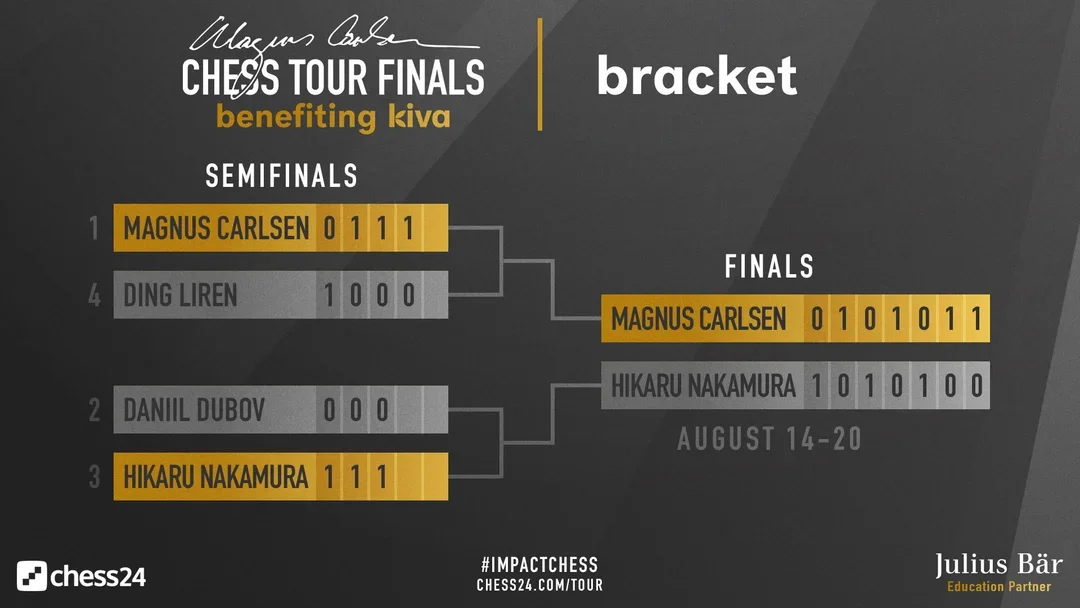
While it’s fun to analyze these games and talk about who won and why, I think that the true winner here is the game of chess itself. This ancient game is enjoying an impressive surge on online platforms and, despite the fact that I personally prefer over-the-board chess, it is excellent that chess can see growth in the time of this COVID-19 pandemic!
Categories
Archives
- December 2025 (26)
- November 2025 (29)
- October 2025 (39)
- September 2025 (27)
- August 2025 (29)
- July 2025 (43)
- June 2025 (25)
- May 2025 (24)
- April 2025 (29)
- March 2025 (29)
- February 2025 (20)
- January 2025 (24)
- December 2024 (34)
- November 2024 (18)
- October 2024 (35)
- September 2024 (23)
- August 2024 (27)
- July 2024 (44)
- June 2024 (27)
- May 2024 (31)
- April 2024 (51)
- March 2024 (34)
- February 2024 (25)
- January 2024 (26)
- December 2023 (29)
- November 2023 (26)
- October 2023 (37)
- September 2023 (27)
- August 2023 (37)
- July 2023 (47)
- June 2023 (33)
- May 2023 (37)
- April 2023 (45)
- March 2023 (37)
- February 2023 (28)
- January 2023 (31)
- December 2022 (23)
- November 2022 (32)
- October 2022 (31)
- September 2022 (19)
- August 2022 (39)
- July 2022 (32)
- June 2022 (35)
- May 2022 (21)
- April 2022 (31)
- March 2022 (33)
- February 2022 (21)
- January 2022 (27)
- December 2021 (36)
- November 2021 (34)
- October 2021 (25)
- September 2021 (25)
- August 2021 (41)
- July 2021 (36)
- June 2021 (29)
- May 2021 (29)
- April 2021 (31)
- March 2021 (33)
- February 2021 (28)
- January 2021 (29)
- December 2020 (38)
- November 2020 (40)
- October 2020 (41)
- September 2020 (35)
- August 2020 (38)
- July 2020 (36)
- June 2020 (46)
- May 2020 (42)
- April 2020 (37)
- March 2020 (60)
- February 2020 (38)
- January 2020 (45)
- December 2019 (34)
- November 2019 (35)
- October 2019 (42)
- September 2019 (45)
- August 2019 (56)
- July 2019 (44)
- June 2019 (35)
- May 2019 (40)
- April 2019 (48)
- March 2019 (61)
- February 2019 (39)
- January 2019 (30)
- December 2018 (29)
- November 2018 (51)
- October 2018 (45)
- September 2018 (29)
- August 2018 (49)
- July 2018 (35)
- June 2018 (31)
- May 2018 (39)
- April 2018 (31)
- March 2018 (26)
- February 2018 (33)
- January 2018 (30)
- December 2017 (26)
- November 2017 (24)
- October 2017 (30)
- September 2017 (30)
- August 2017 (31)
- July 2017 (28)
- June 2017 (32)
- May 2017 (26)
- April 2017 (37)
- March 2017 (28)
- February 2017 (30)
- January 2017 (27)
- December 2016 (29)
- November 2016 (24)
- October 2016 (32)
- September 2016 (31)
- August 2016 (27)
- July 2016 (24)
- June 2016 (26)
- May 2016 (19)
- April 2016 (30)
- March 2016 (36)
- February 2016 (28)
- January 2016 (32)
- December 2015 (26)
- November 2015 (23)
- October 2015 (16)
- September 2015 (28)
- August 2015 (28)
- July 2015 (6)
- June 2015 (1)
- May 2015 (2)
- April 2015 (1)
- February 2015 (3)
- January 2015 (1)
- December 2014 (1)
- July 2010 (1)
- October 1991 (1)
- August 1989 (1)
- January 1988 (1)
- December 1983 (1)







